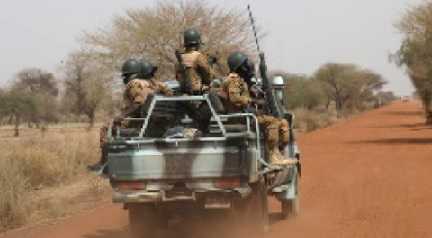
OUAGADOUGOU, Burkina Faso (AP) — Gunfire rang out early Friday in Burkina Faso’s capital and the state broadcaster went off the air, sparking fears that another coup attempt may be underway, nine months after the democratically elected president was ousted from power.
The whereabouts of coup leader-turned president Lt. Col. Paul Henri Sandaogo Damiba was not immediately known but a statement from his government on Facebook urged people to remain calm.
“Negotiations are underway to bring back calm and serenity,” said the statement attributed to the presidency spokesman. “The enemy attacking our country only wants division between Burkinabes.”
Friday’s developments felt all too familiar in West Africa, where a coup in Mali in August 2020 set off a series of military power grabs in the region.
“This smacks of a coup attempt,” said Eric Humphery-Smith, senior Africa analyst at risk intelligence company Verisk Maplecroft. “While gunfire around military barracks could be due to some form of mutiny, the closure of the national television station bodes ill.”
On the streets of Ouagadougou, some already were showing support for what they believed was Damiba’s ouster.
“We are demonstrating to support this coup, confirmed or not,” said Francois Beogo, a political activist from the Movement for the Refounding of Burkina Faso. “For us, it is already a coup.”
Beogo said Damiba “has showed his limits” during his nine months in power. “People were expecting a real change,” he added.
Last week, Damiba had traveled to New York where he addressed the U.N. General Assembly. In his speech, Damiba defended his January coup as “an issue of survival for our nation,” even if it was ”perhaps reprehensible” to the international community. On Thursday, he had given a speech in Djibo in the country’s volatile north.
Burkina Faso’s January coup came in the wake of similar takeovers in Mali and in Guinea, heightening fears of a rollback of democracy in West Africa. None of the juntas has committed to a date for new elections, though Damiba said last week that the transition in Burkina Faso would last for almost two more years.
Many in Burkina Faso initially supported the military takeover, frustrated with the previous government’s inability to stem Islamic extremist violence that has killed thousands and displaced at least 2 million. Yet the violence has failed to wane in the months since Damiba took over. Earlier this month, he also took over the position of defense minister after dismissing a brigadier general from the post.
“It’s hard for the Burkinabe junta to claim that it has delivered on its promise of improving the security situation, which was its pretext for the January coup,” Humphery-Smith said.
Earlier this week at least 11 soldiers were killed and 50 civilians were missing after a supply convoy was attacked by gunmen in Gaskinde commune in Soum province in the Sahel. That attack was “a low point” for Damiba’s government and “likely played a role in inspiring what we’ve seen so far today,” added Humphery-Smith.
Chrysogone Zougmore, president of the Burkina Faso Movement for Human Rights, called Friday’s developments “very regrettable,” saying the instability would not help in the fight against the Islamic extremist violence.
“How can we hope to unite people and the army if the latter is characterized by such serious divisions?” Zougmore said. “It is time for these reactionary and political military factions to stop leading Burkina Faso adrift.”




